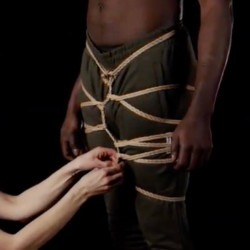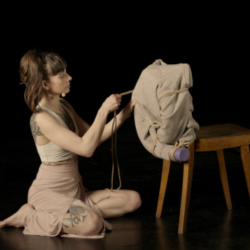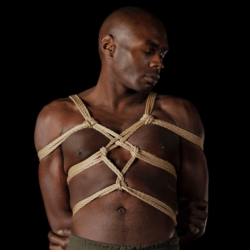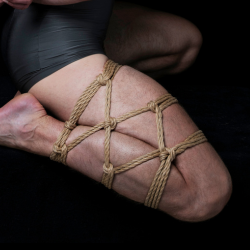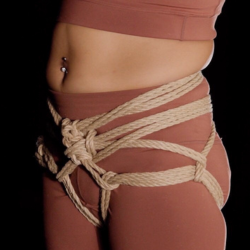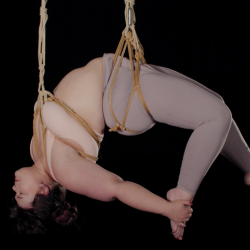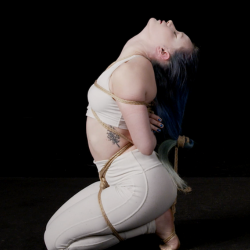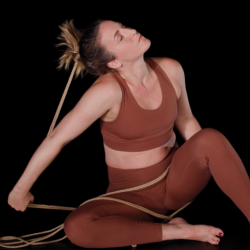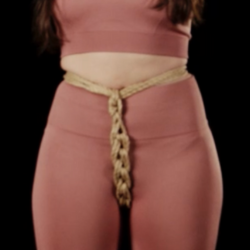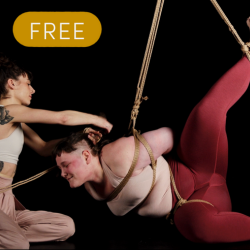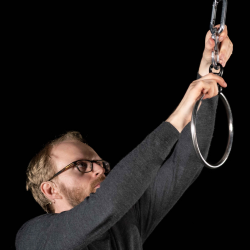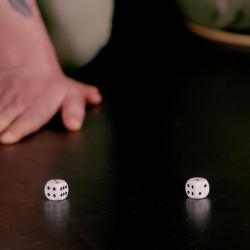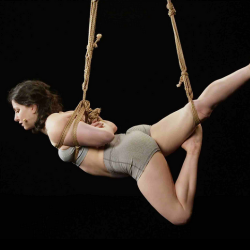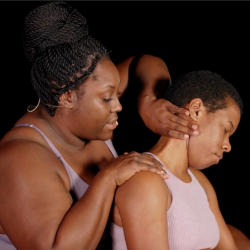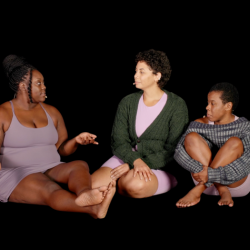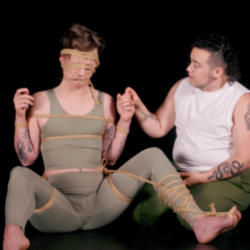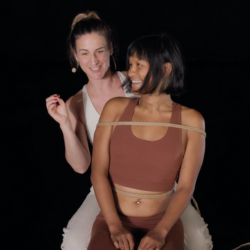EP 01
MEET THE FOUNDERS
Join the founders of Shibari Study as they share intimate insights of themselves, the company's origin story, and their visions for the future.

Sinai and Anton are the founders of Shibari Study. With 10+ years of bondage experience, Sin is the heart the company and Anton the conceptualizing mind.
Wicked Wren [00:00:02] Hello friends, and welcome to the first episode of the Shibari Study podcast. I'm your host Wicked Wren. The goal of this podcast is to get closer to the people in our scene and explore intersections that aren't possible to grasp from photos online. And with that said, we have two of the best guests a podcast host could ask for. Sīn (Gorgone) and Anton, the founders of Shibari Study. How are you two?
Anton [00:00:47] Hi. Nervous. Can we swear on this?
Wicked Wren [00:00:51] I think, well, let me ask with the founders of Shibari Study and see what they say.
Anton [00:00:56] We're swearing on the podcast.
Sīn [00:00:57] Yeah, I think we can swear on the podcast.
Anton [00:00:59] All (...) aside, I'm a little bit nervous. This is the first podcast I'm ever doing.
Wicked Wren [00:01:03] Oh, my God. Well, look, you own the company. So I think that the bar is kind of like where you set it. You can do anything you want on this podcast.
Anton [00:01:10] I love that. Otherwise doing amazing, thriving. How are you?
Sīn [00:01:14] Yes. I'm really good. I'm excited to do this interview together and kind of like, I guess dwell a bit in the past. Because time goes so fast and things grow sometimes in a way that makes us forget how it started. So I'm actually excited that we're going to be talking a bit about like the whole project, going back.
Anton [00:01:36] I'm going with Sīn. It does go back, yeah.
Sīn [00:01:37] Yeah.
Wicked Wren [00:01:38] That's amazing. So Anton, I hear that in addition to Shibari Study, you also deejay, correct?
Anton [00:01:47] Do I deejay? No, I don't deejay. I'm really into music and photography.
Wicked Wren [00:01:52] Well, you do make music, right?
Anton [00:01:53] Dibble and dabble. I've got my record players right in front of us here. But am I a DJ? I would never consider myself one. Throw stone here in Berlin, you're sure to hit a deejay.
Wicked Wren [00:02:04] I thought you produced the music, for some reason.
Anton [00:02:07] We have synths and I do make music. But I'm not a musician. No.
Wicked Wren [00:02:12] Okay.
Anton [00:02:14] Would you consider it otherwise?
Sīn [00:02:15] Hell, no, he's not a musician.
Wicked Wren [00:02:21] Well, everyone—
Sīn [00:02:22] No, he does like kind of semi-collect vinyls and gets very excited about like digging out tracks and records. And he will play once in a while, but it's just, like, for friends and just like, at home. Basically.
Anton [00:02:37] Yeah. When the after-hour moment starts, that's...
Sīn [00:02:40] He's an after-hour DJ.
Wicked Wren [00:02:42] Let's go with that.
Anton [00:02:44] Exactly. There's a big difference.
Wicked Wren [00:02:46] Well, I'm so sorry. I'm going to revise all the documents that I set out. Anton is an after-hours deejay only.
Sīn [00:02:53] Yes.
Wicked Wren [00:02:55] Sīn, you talk a lot about daydreaming and manifesting throughout your life. Have you always been a dreamer?
Sīn [00:03:02] Yes, definitely. I mean, I grew up as a single child in the middle of nowhere countryside, so I spent like most of my time with animals and just running around in nature. So I guess I kind of developed this very strong inner world but also inner monologue. And I – yeah, I always – I don't know, I think it's like a superpower and also an absolutely horrible thing but I'm constantly thinking about how things are and how they could be better. And I try, whenever I can, to turn this more like self... I don't want to say 'self-harming' but almost like self-harming, like intrusive thoughts, I tried to turn them into more inspiring directions. And rather than just like feel bad about what I think is missing or what I think is lacking or what I think is flawed, I try to start picturing in my head a rough idea of what I would want. And then I found out that if you start doing this very consciously, it really helps actually manifesting a lot of things because it changes your— it changes the inner monologue and it changes the way you act them out in the world I guess. So, yes, I still do it.
Wicked Wren [00:04:34] Do you remember the first time you changed that narrative in your head as a kid? Like, what were some of the first things that you did that with?
Sīn [00:04:43] As a kid, I don't think I ever managed to do it. As a kid, it was more just like this lonely self-talk and self-judgment and it made me feel more isolated than anything else. As a teenager, it got even worse, and I felt very alienated from pretty much everywhere and everyone. But then growing up— I mean, I have to say, actually, it's going to sound like I'm making this up and it's super cliché, but one of the first times I started seeing like potential for my weirdness to become actually like a strength was really when I discovered shibari. And it kind of, I don't know, like all of a sudden, like finding this strange underground, you know, like activity with a bunch of super weirdos who seem to somehow have made a sort of big family together and people actually creating things from a place of, I don't know, like... I don't know. I don't want to speak for others, but I feel like one of the – at least when I started over a decade ago – I felt like one of the big common thing between all people involved in (…) was this desire to kind of channel the chaos and channel the pain and make something positive out of the violence that lived inside of them. And this, all of a sudden, I felt like, "Oof, okay, here's like a channel." There's like, you know, it felt like all of a sudden I was drowning in the super agitated sea and feeling like "I don't know how to swim this," and then all of a sudden I felt this like, undercurrent that, like, had a direction and I could even influence this direction. So I would say that the first time I felt like I could go in my head and build a fantasy that I can actually then act out in the real world.
Wicked Wren [00:06:58] You've said that your mom kind of told you to go out and do stuff. When you came back, did you tell her that you found this community? Like, how did your family respond to that?
Sīn [00:07:08] So when my mom, like— I always had a very, very open relationship with her, we were always very honest to each other and even the few lies that I kind of fostered as a teenager, I always kind of came out to her pretty soon afterwards. So I never lied to her about what shibari is and the things that I liked about it. Even at that time, in the very, very beginning, I was doing like pretty hardcore stuff, actually very explicit, and I had a whole bunch of pictures and videos published. You know, I was like 19 or 20 and I had these like, it was not exactly like (…), but it was definitely like very naked bondage with pretty intense violence. And she knew that. She always said, "I don't want to see, I don't want to see those things. I don't want to see those images. If you have like nice, beautiful, more like arty stuff to show me, I would love to, but I don't want to see the hardcore (…)." But so to her, I never lied. And she really knew. And I think, first of all, like parenting me through teenager hood, I think was like if she survived this as a parent and managed to kind of stay out of my way and trust me that I will land on my feet. Like bondage for her was like extremely, like easy and reassuring to deal with. She was like, "Oh okay, that's not like direct self-harm, so let's go with that. Sounds okay. It's also a positive outlet." It was hard for her to see it but she could understand that I was doing something with my body. I was doing something that involves socializing and empowering myself. And I think she actually felt pretty good about this, and she saw that my social life and my mental health and my happiness, my general happiness, was improving, and that's all that mattered to her. And after, I don't know, about six months or half a year of – maybe, I think a year or half a year, I don't know – pretty soon after I found shibari and started diving really hardcore into it, so I quit art school to start really traveling around and meeting people and doing this. And at some point I started feeling really bad that I had my mother paying my rent because I was supposed to be studying and then I was not studying. I was just going around getting tied up by a bunch of people. So I talked with her and I was like, "Hey, listen, I'm going to find a job." And then I found this job in an outlet store that was like five days a week, and, you know, that's it, all year round. And when I told her this, I was really proud to be making the right decision. Then she kind of freaked out. She was like, "No way, you cannot do this. I know this is not for you and you're going to, you're really going to go crazy with a life like this, and you're not going to be able to travel anymore for shibari if you work five days a week. So how about I support you for one more year and if you don't find a way to become financially stable with this, then we'll talk about it again? But please give it a try." And that's one of the most amazing things that she's ever done for me.
Wicked Wren [00:10:32] It sounds like your mom really encouraged the entrepreneurial spirit?
Sīn [00:10:36] She encourages... I think if it shows itself as an entrepreneurial spirit, then she will support this, if she has the financial capacity to do it. But she's really just generally someone who supports people when she feels— like, she's a very intuitive person, I think. She's a psychotherapist and she's suffered a lot in her own life from not being able to find herself and express herself. It came really late to her. And I think she's very sensitive to this in general, when she feels that someone might have found what's their actual path and what's their talent or what will just make them happy and she can support this, she really wants to. And in this case, it meant supporting like my – I mean, at the time it wasn't an entrepreneurial career. I mean, 12 years ago, a 19-year-old who was half a year into getting excited about bondage... when I told people, I think I can make a job out of this, like everybody was laughing at me.
Wicked Wren [00:11:40] Yeah.
Sīn [00:11:41] People who were not into bondage were like, "What the hell? This is just a crazy phase and she's going to get over it." And people who were into the bondage scene were like, I mean, there's like a handful of people all across the world who make a living only out of this. And they're all like old-school, old generation men who tie.
Wicked Wren [00:12:04] Absolutely.
Sīn [00:12:05] Like where do you think you're going as a 19-year-old bottom? I don't think she supported any entrepreneurial ventures. She was just supporting her child...
Wicked Wren [00:12:16] That's really beautiful.
Sīn [00:12:17] ...that just started to show, you know, like signs of like happiness and excitement and passion.
Wicked Wren [00:12:26] It sounds like everyone needs someone like your mom in their life. That's really amazing that you have her.
Anton [00:12:31] Yes.
Sīn [00:12:32] She's really, I mean, I don't know. She's really incredible with this.
Anton [00:12:37] Your mom is special. I will forever be indebted.
Sīn [00:12:40] Yeah, she really, she really changed my life as her child. But I think Anton always speaks about her as, like, she really changed also his life by then later, when he stepped in, supporting the entrepreneurial aspect of it. And she's like really committed to help, in general.
Wicked Wren [00:13:02] Anton, if you could summarize Sīn's mom in one word, what would it be?
Anton [00:13:10] The only feeling that comes up for me and the only word is gratitude. One word to summarize 'maman'? That's a hard one. She's beautiful.
Wicked Wren [00:13:21] What is your origin story? Where did your spirit come from? You're a dreamer as well.
Anton [00:13:28] Mine?
Wicked Wren [00:13:29] Yeah.
Anton [00:13:34] Born and raised in Berlin. My dad's from Canada. My mum here from Berlin. And, I don't know, being raised in Berlin right after the wall came down. There were so many different influences and it was really it was a really, really fun time. There was so much - it was such a new city and there were so many niches that you can diddle and dabble in. And none of these, none of these scenes were very established like in all of the other cities. So anything you did, anything you were passionate about, you could find your community for it and really like climb the ladder very quickly there. If you were in Paris, New York or London, all of these niches are so established since so many decades that it's impossible to reach as a nobody. But that - I don't know - that freedom, that energy of change was really formative for me, too. Yeah.
Wicked Wren [00:14:27] And what niche were you exploring at that time?
Anton [00:14:31] Wow.
Sīn [00:14:34] Me. We both have a turbulent past.
Anton [00:14:37] Yeah, yeah, yeah. So. Let's start around the time that I met Sīn. It was more of a - I was traveling and partying. And trying to study. It took me - I graduated high school, barely, but then it took me six years of traveling and doing god knows what until my mom was slowly beginning to worry, to say the least. And I was like, okay, mom, look, I'll do something. And then I was, introspectively I was like what do I like, what am I into and it was really just plants and insects, right?
Wicked Wren [00:15:21] Wow.
Anton [00:15:21] I'm much, much like Sīn. My biggest talent.. I'm not great at anything, really. But what I can do is bring order to chaos. And I'm I see potential and I'm really into like, like ordering like people's talents and technologies in order to make things like systems. And I think that was that was the perfect match. So Sīn brought the intention, the philosophy, the experience, and I brought the vision and also the need, to be honest, like Shibari Study as it is now, was borne out of the need to learn bondage, which... Yeah.
Wicked Wren [00:16:02] Wow.
Anton [00:16:03] Which we then did through Shibari Study. Yeah. And with the help of maman.
Wicked Wren [00:16:09] She's kind of like the third founding member of Shibari Study, wasn't she.
Anton [00:16:13] She was the only founding member.
Sīn [00:16:14] She's basically the only founding member.
Anton [00:16:15] My goodness. Yeah. Yes, yes. She's the all-seeing godmother.
Sīn [00:16:20] Well, I know who I need to get on the podcast soon.
Sīn [00:16:23] Yeah.
Sīn [00:16:23] You can hook me up. That'd be great.
Sīn [00:16:26] She's actually like, it just made me think that it's been a while that she's asking to be a model for one of our shooting. Like she's never been tied. And she asked me a few times. She was like you know what? Like I really don't get it. I respect it and I don't judge it but I really don't get it. So maybe the best way for me to understand why I don't like it or actually find out that I like it would be to try. So she's asked me a few times to tie her, and every time I'm like uh, yeah. Like I'm kind of excited but also like do I want to do that? But also would I trust anyone else tying my mom?
Wicked Wren [00:17:03] Yeah. So that was my question.
Sīn [00:17:06] And then why not? Why not do it for one of your shootings where it's like very chill and casual. And we almost made it but for some reason then it didn't happen. And ever since, like, I don't know, we should actually... Yeah, let's do it.
Anton [00:17:18] It'll come.
Sīn [00:17:20] We should actually do it. She still asks for it regularly.
Anton [00:17:22] 2023.
Sīn [00:17:23] That is one of the coolest things I've ever heard.
Sīn [00:17:27] That would be really cute actually. Maman on the website.
Anton [00:17:30] I love that.
Sīn [00:17:31] It was really cute. So when did you two meet?
Sīn [00:17:37] Oh wow.
Anton [00:17:38] That was a while ago. When was this? It was four years ago?
Sīn [00:17:42] It was early 2018 like spring of 2018. I had just moved back to Berlin after an extremely brutal ending of a previous relationship. And I kind of like crash-landed in Berlin.
Anton [00:18:00] Without your horse.
Sīn [00:18:01] With nothing. With just one suitcase, basically. And I just crashed at like friends' places and I was really a wreck. Like I was very lost and I was just very tired. I had also come out of like about eight years of like solo traveling and teaching and burnouts after burnouts and then this very, very extremely failed relationship that really like broke my heart into a million pieces. So I was kind of like in, I don't know, like some sort of like wreck mode where I was just desperately looking for anything to get me excited again. But I was way too tired to teach. I was trying to slow down the traveling. And I had recorded like maybe five tutorials, like maybe some of the people listening here who were like really, really old, like followers of Shibari Study. They probably remember like those videos were like out there for some people to acces but it was like self-produced, like super low quality and it was only like five of my original harnesses because I didn't feel like legitimate to teach anything else. And it was also very experimental, basically, to like just put bondage classes online. So I wasn't sure it was going to work. But I had this and still like one residency in Paris where I was teaching once a month. So I was pretty tight on like, you know, money and energy. And then I met Anton. We met in a cafe where he was working. He was working there as a barista. And then slowly I stopped paying for the coffee. And then he started sitting at my table a little bit longer. And then eventually we went out for drinks once, and then we stayed together for three years.
Anton [00:19:50] Three years?
Sīn [00:19:50] Oh, my God.
Sīn [00:19:52] And pretty early on, like, a lot of (…) happened. Like basically the one residency I had in Paris, the venue shut down. I was basically the kind of like godmother of this place. And then it turned out that the founder and like leader of this community committed a certain number of (…) assaults on very young new models. So I kind of pulled out and most of the staff pulled out in the venue just closed. So that was also over. And at the time we were like, I don't know, in the first few months of the relationship with Anton and he saw me like freaking out. And I was like, okay, I need to pick up this online classes thing. I'm exhausted by the community. I'm tired of all this (…) coming out all the time. I'm tired of not being able to trust like community leaders. I'm not planning on becoming one and I'm tired of traveling alone. And I need to settle somewhere in the world where I can build actual connections and relationships and, like, stabilize myself. But I cannot do this. I'm extremely chaotic. I have no, I always have, like, I think, powerful ideas. But I have, I cannot, like I can barely open my mail and pay my electricity bills. So building a company, founding an actual company and making all of this happen by myself, I really couldn't see it happening. So he just kind of naturally jumped in and started helping me out so much that we were both like, working 14 hours a day on our laptops, just like trying to plan things and self-produce in our tiny little one-room studio apartment and edit. And we were doing everything by ourselves. And after a while, I told him like, I mean, you can't continue helping me out like this just for nothing. So if we build this company, then let's build it together 50/50. And if anything happens to our relationship, then at least it will be both our baby, and you will continue to be committed to it. So very quickly, actually, like I think half a year after we were together or something, we just found Shibari Study together.
Anton [00:22:05] It was quite quick, yeah.
Sīn [00:22:07] It was pretty quick.
Anton [00:22:07] The first year or so, I think we were traveling.
Sīn [00:22:09] Maybe one year.
Anton [00:22:11] You were still teaching a lot. I was trying to do my little gigs here and there. But I guess it all came down - in the beginning, because like Sīn was saying, it was just are few harnesses on the platform and I really wanted to learn bondage. I was in all of these workshops.
Sīn [00:22:28] But I didn't want to teach you.
Anton [00:22:30] I did not want you to teach me. No, no. So I was left with a question how do I learn bondage, shibari without having to ask Sīn directly to teach me all the basic knots to begin with. So I went online. I was looking for some... how do I teach the tk, how do I learn TK, how do I do the single-column, the double column. And there was no real good information out there. And then I also thought like this platform, like the problem that I have, like most people have in the beginning, there's a huge, huge hurdle for someone to have a curiosity for bondage but then that hurdle of actually going to an in-person class as a newbie, it's connected to so many fears and stuff. That is a big one to jump. And to make that a little bit more accessible and also for me to learn myself, I was like, hey babe, we need to shoot an entire beginners course. So we set up the studio. We were living in a one-room apartment and we blacked it all out, setup a couple of lights.
Sīn [00:23:34] I resisted that one.
Anton [00:23:36] You really resisted that.
Sīn [00:23:38] I really resisted that one.
Anton [00:23:39] That was the beginning of everything. Really diversifying the content.
Sīn [00:23:42] Why did you resist it?
Sīn [00:23:44] Because it felt like such a huge responsibility to teach beginners content online. And for a really long time, I had said, like, I will not teach beginners stuff and I will not teach advanced stuff on Shibari Study for a really long time. That was kind of like my - that's what I had decided and what made me feel like it was the safest thing to do and the most reasonable. But then Anton convinced me that it could actually be much safer and much easier for a lot of people to just learn these things at their own pace and not just like go to a class, see a bunch of things, get overwhelmed and go home and have nothing to review the techniques and practice by themselves. So there was this aspect. And then I also realized there are so many awful teachers out there and there are so many places where people just don't have access to proper education. Like rope education. And they just end up - because they don't know better - they just end up in these really terrible, you know, whatever, kind of self-proclaimed teacher environments and they also learn dangerous things and they can't even review it afterwards. So if they forgot - like I noticed as an instructor that if you teach like ten ties to people over a weekend, they might really remember one. And the other nine, they've seen it, they've done it with your help and supervision. But as soon as they go home, it's gone. You know, people are always like can I make a video, you know, while you teach. Can I take pictures? Going to make a video so I can review it at home? And I was like, wow, that's also not such a safe thing to do because you just recorded that thing that was taught in a candid way. So it wasn't taught in a way that specifically is made to be reviewed. You know what I mean?
Sīn [00:25:44] Yes.
Sīn [00:25:45] Maybe I gave some specifications while I was teaching that they didn't record or maybe they recorded with the wrong angle or whatever. So I started to also rethink this and, you know, feel like, okay, maybe if I really put a lot of thoughts into this and we curate it and produce it and like if I make the curriculum in a very specific way and then we release it in a platform where people have like unlimited access to the information so they can go again and again and again, then it actually might be as safe as in-person education, not as a standalone. Like, I still really believe that it's important to have both. But it will at least give people some standard. So when they go out there and look for in-person education, if the teacher makes no sense or the teacher doesn't explain things properly, like I think one of my best qualities as a teacher is to dive really deep into the why and how and not just like do it because I said so. And I think that was like - that's something that's valuable to people when they go and look for in-person education. So I started rethinking this and eventually accepted to do the beginner course. But I think it took me like half a year to plan. Like I dragged it. I was like, I really need time. I need to feel very confident with what I'm teaching and how I'm teaching it, and that the curriculum evolves in a way that will really take people through everything they need to know so that they can do those basics safely and autonomously.
Wicked Wren [00:27:17] It sounds like there's a huge responsibility that goes along with making beginner courses.
Sīn [00:27:21] Yes. Absolutely. I mean, there's a responsibility that goes along with just teaching anything that's like high risk, whether it's in-person or online.
Wicked Wren [00:27:31] Shibari Study in many ways is an act of rebellion against a system that's in place for a long time. What were some of the fears that you had early on, like you said, that you were - you didn't want to teach beginner stuff. You didn't want to teach advanced stuff. How did that play into it?
Sīn [00:27:47] I mean, I think these were more like internal fears and I just had to review the reason why I was worried about this and eventually find out that they were valid worries. But there were ways around it. There were ways to make it actually safer and even like very beneficial and very complementary with what existed already. But if you're talking about a system that I was kind of rebelling against, I think I just felt like the groundwork of trying to shift many paradox of the bondage community. And I mean, you know, the bondage community doesn't exist in a vacuum. It still reflects like our world and our societies and the global system. And it felt very male-dominated. It felt very stereotypical, you know, hetero-stereotypical. It was, you know, just like when I started, it was 99%, maybe not but at least in what I experienced of like older men tying very young new bottoms. And I felt like that's just not fair. And it's not... people talk about how it can be empowering but I felt like it was... The empowerment was really very limited. It just kind of like enabled people to choose to live those experiences but always in a way that continued to repeat probably their past traumas or their general like, you know, social trauma and social limitations. And we were a few people trying to change that. I wasn't the only one but we were a few handful of people really trying to like, push for like, you know, female or at least like non-male riggers and trying to become more, you know, respected and become more skillful and talented to the point that we could start teaching and performing and like, you know, representing a different approach to bondage and people who were trying to also bring different disciplines into it and different intentions and make it more like, you know, more spiritual or a bit more like political or, you know, like so on and so forth. But I mean, I think you can ask this to anyone who was part of this movement, quote on quote. It was exhausting. And we got really damaged also on the way. And it felt like, okay, we're creating a little bit of a different type of representation, but at what cost? And we're not really changing the roots of the problem because most of the people who would want to access education can't. Because it's too expensive. I mean, if you go to a a weekend workshop with, you know, like a renowned instructor, it's an enormous cost.
Wicked Wren [00:30:52] Absolutely.
Sīn [00:30:53] And you have to travel and you have to, you know, it's super expensive tickets and then, you know, okay, that's it. Then you had access to that one course and you go back to maybe a community where there's nobody who's in the same mindset and then you. So another very big motivation for Shibari Study was also to like really make high quality education, not just in the way it's recorded, but the actual content and later on varied content by bringing other instructors and to make this accessible to as many people as possible. Like, I don't think we can... Like, we cannot say that a space is always safe. We cannot say that it's accessible to everyone but we tried to make it as accessible to as many people as possible, and I felt like that was actually a much more powerful tool to do that and to try to open up this community and like create like deep change at the level of the people practicing, not just the level of the people who are already talented and skilled and renowned.
Wicked Wren [00:31:58] Definitely.
Sīn [00:31:58] And really build like a whole other kind of current.
Anton [00:32:04] Yeah.
Sīn [00:32:05] There was an interview where you were asked what were some of your funny mistakes that you made and you answered none of them were funny in the beginning and that really hit me.
Sīn [00:32:18] Yeah. I mean, being a, you know, female-bodied, very young person diving into this world with like, I had a lot of ambition but I also didn't know anything. I was barely like, you know, super young adult. So you're you're barely formed. Like your thoughts and your knowledge of yourself and the world around you are not very sharp yet. I was very naive. I was very influencable. I was very damaged and I made choices and I allowed other people to make choices for me that were incredibly damaging and traumatic and really not funny at all. Like if we're talking about mistakes, like, woops, I dropped someone one time. Even this is not fun. Like, I don't think I, like none of the mistakes I made that hurt other people or that hurt me were ever funny. Like, it's a pretty high-risk discipline. It can be very, very beautiful and very helpful and very empowering and just brings so much joy and pleasure. But like everything high risk when you do make mistakes, both physically or emotionally, they're profoundly, you know, impacting.
Wicked Wren [00:33:34] Yeah. Taking the rope side out of it, looking at only the Shibari Study company side, when you open the website right now, it looks like you're navigating a five-star hotel website. It's amazing.
Anton [00:33:49] Oh, stop it, Wren.
Wicked Wren [00:33:52] Thank you.
Wicked Wren [00:33:52] Let's say if I'm going to suck up to anybody, these are the people to do it to. But I have a feeling that it wasn't always like this. How different was it? And, you know, what were some things that you were worried about in the beginning that didn't really matter that much? You know, like making mountains out of molehills kind of thing.
Wicked Wren [00:34:12] I think Anton can take over from here and like talk about the general aesthetics and organizational process of the early Shibari Study under my solo governance.
Anton [00:34:24] Yeah.
Wicked Wren [00:34:26] What was it like when you came in?
Anton [00:34:28] Chaos. Unstructured chaos with so much potential though. It was already, Shibari Study already had some really good following before, but it was not navigable. I don't know. I think it plays into the whole accessibility part of Shibari Study. The website needs to be incredibly diverse. It has to be inclusive and definitely navigable. Now, at this point, we've already created a pretty extensive library of courses and classes and different approaches and instructors and even like rope philosophies, if you can put it that way. And also to make it accessible. It has to look good. Though I mean, it started only with video tutorials and then we went to live classes that we stream on a good week two or three times a week. We're bringing out all these new features and this all has to fit under one roof and it's bringing structure into it. I love that.
Wicked Wren [00:35:33] A couple of years into the formation of Shibari Study, a global pandemic happens. How did the lockdowns shape Shibari Study?
Anton [00:35:45] So this changed everything because then, I mean, it's been years that I haven't really been in an event. And I don't know, I think if we're talking just more generally without talking about Shibari Study specifically, but how the pandemic impacted the bondage scene from what I see online and what I hear when I still do meet people who are in the community and talk with them is, you know, I think it did both some good and some bad. Like the bad, the negative effects obviously, were that, as Anton said, the whole point of this practice is to connect with other people physically and emotionally and like very directly. It's really like a tunnel through, you know, the walls and all of a sudden people couldn't do this. They couldn't meet their partners, they couldn't go to events, they couldn't socialize. So for people who are really into the community and socializing aspect of shibari who love to go to rope jams and meet new people like, you know, like-minded people and fellow (…). I think that was really, really tough and really difficult. And I don't think that Shibari Study and other online platforms, that do exist, could bridge that gap. Like we could still provide knowledge, but we couldn't do anything about the lack of physical connection. But I guess what it did in a more positive way is that I am pretty sure it allowed a whole new generation of people who were curious and interested to start in a way that, as frustrating as it might have seemed to them, really help them build some knowledge before they went out there and met new people and trusted them with their bodies and hearts. And by the time they could again, like go to jams and meet people, I feel like all the time they had to spend online on different platforms learning probably, actually helped them build like a lot more of a clear idea of what they want and maybe what they don't want and how they want to approach it. And I think maybe for some people who were already active, it gave them the opportunity to also like sit back, slow down, relax because I think pretty much everyone new to anything but I feel like especially with shibari with this sort of like kind of addiction that it triggers in the very beginning, a lot of people, especially bottoms become very, very greedy and bulimic very quickly. I was definitely one of those. And it's a lot of very young people. So if you start and you discover shibari, you know, later in your adult life and you probably already have a partner that you trust and know that you're starting this with, I think you're pretty okay. You know, even if things go wrong, you already have like a foundation of trust and love. But for a lot of very young people who just kind of jump into this very excited and still naive, you get yourself into really tricky situations and it doesn't necessarily go wrong, but it can go wrong very quickly.
Wicked Wren [00:39:02] Absolutely.
Sīn [00:39:02] And I feel like the pandemic forced everyone to slow down. And as bad as it is and as bad as it was, I think there was also this positive aspect to it.
Wicked Wren [00:39:15] That makes total sense. I was the same way where I got into it and went very, very quick. If I could tell myself anything, it would be slow down. But I don't know anybody that's been able to slow down. Do you think it's possible to tell someone that's just found rope bondage, hey, take it slow.
Sīn [00:39:31] I mean... Wow.. Well, I mean, you can you can tell people to slow down. I think everyone was told to slow down by someone else who's been doing it for a longer time and was like, hey, maybe you want to, you know, take baby steps. I think it comes down eventually to people's nature. Some people are more like wired for like self-protection than others. And these people will listen. But if you're a bit more, you know, impulsive and like, have these very intense drives, shibari will definitely kind of activate this. It provides so many positive things that it's difficult to see how easily you know, how slippery of a slope it can be. But I do think that maybe the most positive thing that not Shibari Study but the online, the general like online world around (…) and bondage has done is provide so much, like stories, there's so much things that are out there of like stories of people that went through something difficult, public call-outs, public like takedowns of venues and certain community leaders who were extremely toxic. People sharing their experiences. People being much more transparent. There's not really any gatekeeping left. There is maybe a little bit in certain like, you know, schools or groups of people. But mostly I feel like everyone has kind of like agreed to go for that, you know, like let's share as much as we can. And there's so much knowledge out there and there are so many people willing to share their mistakes. And share what happened to them, but also share what they have done to others. I feel like there's more accountability and this is more accessible now.
Wicked Wren [00:41:28] That makes total sense.
Sīn [00:41:29] So maybe, the combination of all this being out there just a click away and people in your direct surrounding being like, hey, slow down, probably has brought more people to reflect than ten years ago or 15 years ago.
Sīn [00:41:47] Where are we going with Shibari Study? What is on the horizon? What's happening?
Anton [00:41:52] What's happening? Shibari Study, we've got the podcast now, obviously, which is a great feature that we're really excited for. And then there's the blog, which we're working on. We've been working on the blog for more than a year and we're hoping for it to finally be out there in the world that we can share all of this great content that's being written.
Wicked Wren [00:42:11] What kind of stuff is being written?
Anton [00:42:13] Oh, goodness gracious. It it ranges. It ranges. I've got a spreadsheet, so it's probably at least 50 lines of great, great topics. It goes from how to start with bondage, how to be a bottom without without experience and how to navigate tying with somebody new. It goes from different knots, the approaches of different TKs. We've got the different styles. We've got the history of shibari. We're hoping to release all of these articles in the very beginning, and then we're going to grow from there. It's really exciting because this is one of the few features that we can really put out there. And it's free information that we're really bringing out there. And it's really exciting to finally have reached a point where we can create this information hub that everybody can find and finally access.
Anton [00:43:07] Yeah, that's really exciting.
Sīn [00:43:09] I feel like the last year, you were kind of like setting up the ground for a bunch of new things like even the Discord channel that you kind of, I don't know, like went so fast. Like we were having a team meeting and we're like, how can we actually, like, foster an actual community where people can, you know, exchange and like, share their progress? It's sometimes so difficult on Instagram or like social media for people to share (…)-related like images or even like text.
Anton [00:43:41] And also ask questions.
Sīn [00:43:43] And ask questions and have a better access to like teachers responding to them. So I think now is kind of the beginning of us realizing that. Shibari in itself as a product was something that we had achieved, like we've recorded. I don't know how many videos are on the website now, but I think it's something like around 700 videos. There were so many different teachers, like this was kind of our goal from two years ago. It was to like move away from just this is a website where you will find classes from Gorgone, to this is a website where you can find just general bondage education from different perspectives, even have like the same things being taught by different people from different angles. So that was kind of the previous goal that I think we've pretty much achieved. There's still a lot we want to do to bring even more like variety to the content and also more like diversity in the approaches and the teachers and bottoms being represented. But we've pretty much achieved the grounding of this goal. And we started to feel like it's not really enough if we want this to be complete. And I don't know. I feel like at some point we basically had kind of two choices. One choice was how do we continue producing content online that would be free and just also different formats in order to bring like also different perspectives and different information. Because we've had people that, I don't know, I believe were like wonderful teachers, but not necessarily of the technique. But like in terms of the history or just general like reflection around those topics. But that didn't feel like they had any like technical content they would want to teach on video. So one option was this like let's go for just different formats online and the other option was, I guess, at some point maybe we should open a venue. And pretty much immediately as this thought came up, we were like no. Like this, like that would be very destructive to the general ecosystem. And also it's just not what we want to do. And it would come with this sense of like, you know, Shibari Study instructors like, you know, when people say... If we talk about someone teaching on our website as a Shibari Study instructor, it just meant, it just means they have taught something on Shibari Study. But we're not affiliated. They're not representing a specific style or school of thought. And that's something that was very important for me at least. Curating the content is to really give people freedom to teach whatever they would teach anyways. And you know, it would come with this whole thing of maybe like certificates and something rigid. And we really didn't want to do this. So we completely shut down this idea and decided to really stay and, you know, in our line which is online and then just expand from there. And like from this point on, basically Anton and the team came - like they came up with the Dischord idea and the podcast idea and the blog idea and whatever will come next. But I think the future plans of Shibari Study are to try, I don't know, maybe now I'm speaking for myself but try and not change it too much, actually. Just like continue to follow our original mission, which is just providing as much education as we can and make it accessible to as many people as we can. That's really the core mission of Shibari Study. How can we just spread the knowledge and that's it? And then people will do what they will do with it. And our only responsibility is to facilitate the transmission of this knowledge. So I don't know. I think it's important that we find a balance, that you know, there's enough growth that the project sustains itself but without starting to just look for new ways to expand. And I think that has been also a really interesting aspect of this entrepreneurial journey is, I mean, obviously it is a capitalistic venture because it is an entrepreneurial venture. It's a project that we were growing. And as it grows, it generates more profit and more reach and the community is growing. So how to find the balance with this fact and accepting it, which that's something I resisted also a lot in the beginning. It made me feel very conflicted because it goes against some of my values. So understand that this is what we're doing, but then really still try to infuse it as much as possible with our values that are to not go nuts on this basically and try as much as possible to never like lose sight of what the original mission is and get too greedy or too crazy. So I think Anton has been working mostly with the team on improving what we have and just make what we had from the beginning just better. Look better, bigger catalog, you know, more diverse format of delivering that information but not divert from this. So I don't know. I don't think there's a crazy future for Shibari Study basically, just an improvement of what we have now.
Anton [00:49:31] There's no crazy future. And like, the formula is set. Once the blog is out, that's it. That's Shibari Study as it is and will continue to be. I think what people have to look forward to now is great content. It's performances. We shot two days with Kinoko-san. Great, great instructor this time.
Sīn [00:49:53] I think our job from now on is just to continue inviting the right people.
Anton [00:49:57] Bring good people on board.
Sīn [00:49:58] Exactly. That's pretty much it which is already a challenge in itself because I personally wouldn't trust just anyone to teach on our platform. We're pretty selective and it's a difficult selection because there are so many criterias. Like we want it to be technically, you know, high level. We want it to be also like great humans that we love and trust. And we just like who they are and how they want to present, whether presenting. So there's like a, you know, like kind of a human skill aspect. There's a technical skill aspect. There is do they want to do this. There are also a lot of people were like, no, I don't want to be a Shibari Study instructor. That's not the way I want to teach. And of course, we respect that. There are people who feel like they're running out of content or insecure to teach their content in this way. There are just so many aspects that basically our biggest challenge that will always remain a challenge is continue to create beautiful content with beautiful people and try to not produce (…) content just because we need to create content. So I guess this will remain forever the number one challenge of this project.
Wicked Wren [00:51:17] I don't think anybody has ever taken the word (…) content and Shibari Study and put it together. I mean, nothing you two made has been anything but spectacular.
Sīn [00:51:28] Thank you so much.
Anton [00:51:28] Thank you.
Wicked Wren [00:51:28] Thank you two for spending the day with me. I learned so much from both of you. Seriously. You're both inspiring things.
Anton [00:51:38] So good to catchin' up.
Sīn [00:51:39] Thank you so much, Wren.
Wicked Wren [00:51:41] You're welcome.
Anton [00:51:42] It was really good chatting.
Start your free 7-day trial
Get one free week of unlimited access at Shibari Study,
then pay from $17.90/month. Cancel anytime.


